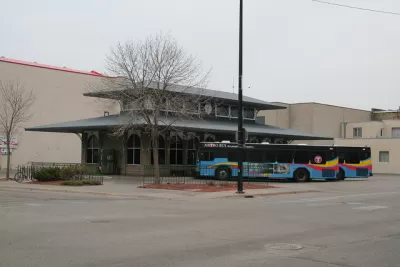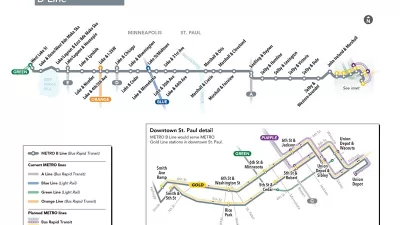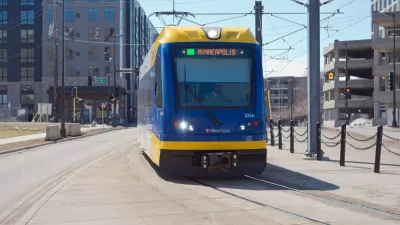Companies struggling to get employees to work are turning to a variety of transportation alternatives not traditionally covered by transit agencies.

In suburban Minneapolis, companies with locations in suburban office and industrial parks face obstacles in getting their employees to work. While transit agencies in the Twin Cities, most notably Metro Transit, provide strong service for suburban workers commuting to the downtowns of Minneapolis and Saint Paul, workers making the "reverse commute" from city to suburb, face spotty service.
The most notable solution to this problem has been made by Amazon, which has a new suburban fulfillment center in the Twin Cities that employs 2,000 people. Amazon is paying a south suburban transit agency, Minnesota Valley Transit Authority, $380,000 to create a special stop on a new bus route and the creation of weekend service. Other companies provide free shuttle buses from locations in Minneapolis to suburban employment locations.
Caren Dewar, executive director of the Minnesota District Council of the Urban Land Institute, questions whether companies will choose to locate, expand or stay in the Twin Cities if the problem isn't addressed. ULI Minnesota calls this a "regional economic imperative." Getting employees to work is a problem companies face in many metro areas across the country, exacerbated by a sprawling development pattern and a jobs/housing mismatch.
FULL STORY: Low-wage jobs are moving to distant suburbs. How will workers get there?

Planetizen Federal Action Tracker
A weekly monitor of how Trump’s orders and actions are impacting planners and planning in America.

Restaurant Patios Were a Pandemic Win — Why Were They so Hard to Keep?
Social distancing requirements and changes in travel patterns prompted cities to pilot new uses for street and sidewalk space. Then it got complicated.

Map: Where Senate Republicans Want to Sell Your Public Lands
For public land advocates, the Senate Republicans’ proposal to sell millions of acres of public land in the West is “the biggest fight of their careers.”

Maui's Vacation Rental Debate Turns Ugly
Verbal attacks, misinformation campaigns and fistfights plague a high-stakes debate to convert thousands of vacation rentals into long-term housing.

San Francisco Suspends Traffic Calming Amidst Record Deaths
Citing “a challenging fiscal landscape,” the city will cease the program on the heels of 42 traffic deaths, including 24 pedestrians.

California Homeless Arrests, Citations Spike After Ruling
An investigation reveals that anti-homeless actions increased up to 500% after Grants Pass v. Johnson — even in cities claiming no policy change.
Urban Design for Planners 1: Software Tools
This six-course series explores essential urban design concepts using open source software and equips planners with the tools they need to participate fully in the urban design process.
Planning for Universal Design
Learn the tools for implementing Universal Design in planning regulations.
Heyer Gruel & Associates PA
JM Goldson LLC
Custer County Colorado
City of Camden Redevelopment Agency
City of Astoria
Transportation Research & Education Center (TREC) at Portland State University
Camden Redevelopment Agency
City of Claremont
Municipality of Princeton (NJ)





























